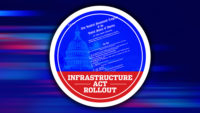Officials at U.S. public transit systems are growing worried about the impact the partial federal shutdown is starting to have, including a lack of Federal Transit Administration personnel on the job to release needed funds and advance projects to their next phases, a transit industry leader says.
Paul Skoutelas, American Public Transportation Association president and chief executive officer, says that the shutdown, which began on Dec. 22, “is certainly a huge area of concern for us.”
Skoutelas told reporters in a Jan. 11 meeting in Washington, D.C., that transit systems haven’t yet reduced services—“That’s a last resort,” he says. However, problems in getting federal funds released have caused cash-flow problems at some agencies.
Skoutelas says APTA is awaiting responses from its members to a shutdown-impact survey, but in the meantime, he and others on APTA’s staff have contacted about 15 local transit system general managers, to ask them about the shutdown.
He says, “What we’re finding is basically for every size system, whether you’re talking about a small bus operation…or up to the largest of systems in the country—whether you’re talking NJ Transit, or New York or Chicago—there are impacts.”
Some FTA grants draw on transit's share of Highway Trust Fund disbursements and though the trust fund isn't affected by the shutdown, FTA personnel are funded by the general fund and a large majority of the staff are on furlough.
A pre-shutdown U.S. Dept. of Transportation memo said that 88% of FTA’s employees were subject to furloughs.
Skoutelas says, “We’re finding in many cases [local transit systems] need those dollars and there’s no one there [at FTA] obviously to answer the phone and to activate release of funds.”
One agency, which Skoutelas says didn’t want to be identified, cited a project that was awarded an FTA Capital Investment Grant. That program is funded by the general fund, and thus its disbursements are blocked by the shutdown.
Skoutelas says that local agency was waiting for FTA to issue a “letter of no prejudice.” That document would allow the local transit system to advance some nonfederal money to keep the project going during the shutdown and verify that it can be reimbursed by FTA when federal funds finally are released.
He says, “They’re ready to move but they need that letter in hand before they go out and make an expenditure.”





